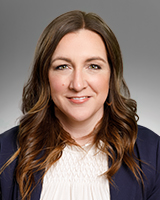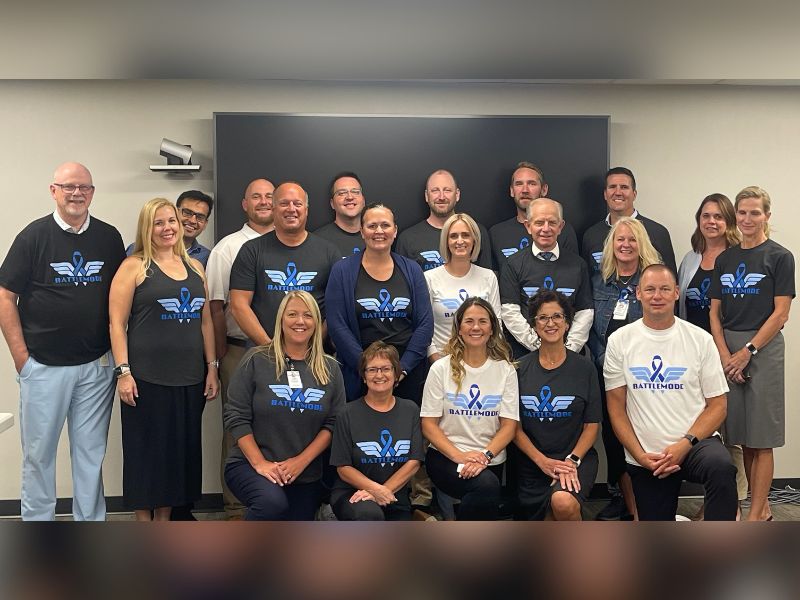There were plenty of symptoms for Kristi Vetter to be concerned about when she had her first conversation with her primary provider about the health issues she was experiencing.
Foremost was overwhelming fatigue. She was too tired to do the things a mother of three active kids usually does. There were other signs, too, that suggested it was time to take a closer look.
Now a cancer-free survivor in the surveillance phase of her recovery from colorectal cancer, Vetter sums up getting the colonoscopy that ultimately saved her life like this:
“I probably knew something was wrong a lot longer than I wanted to admit,” she said. “I was kicking myself that I didn’t do it earlier. I would encourage everybody, even though it might seem uncomfortable, to just go do it.”

Vetter is the case management inpatient director at Sanford Medical Center in Bismarck, North Dakota, with a professional background at Sanford that includes extensive experience as an ICU nurse and flight nurse.
Even with that background in medicine, she hesitated to begin the process.
Suspicious symptoms
However, she took the first necessary step when she described her symptoms to her provider, Josie Senger, DNP, who recommended a colonoscopy and EGD (esophagogastroduodenoscopy).
At about that same time, she had her annual “Employee Connections” meeting with Wendy Kopp, chief nursing officer for the Sanford Bismark region. Toward the end of a conversation that included a review of the last year, Kopp asked if there was anything she could do for Vetter.
“I said, ‘I think I’m really sick. I need some help,’” Vetter said. “We didn’t know anything about me having cancer at that point.”
It was a meeting that, coupled with her visit to her doctor, brought her health problems into focus. By talking about it with someone she worked with, she was admitting to herself that something was wrong.
“I was opting to not go to my kids’ activities, which is very unlike me,” Vetter said. “I just wanted to stay home and take a nap instead.”
Vetter, who turned 40 in 2022, had none of the traditional risk factors associated with colorectal cancer. She was young – Sanford Health recommends colonoscopies beginning at age 45 – and had no history of the disease in her family.
Despite this, her colonoscopy with Yeshitila Mengesha, M.D., indicated cause for concern. The ensuing biopsies confirmed she had cancer.
She had hoped her tests would find something that would explain her fatigue. She did not expect to hear what she heard.
Care and community
Nurse navigator Keila Eisenbeis helped her manage a cancer treatment plan that got more complicated when it became clear her body was not going to tolerate chemotherapy.
The accumulation of side effects, which at one point included a trip to the emergency department, led to Vetter opting for a temporary ileostomy at the University of Minnesota last January. The reversal surgery took place in April.
Both procedures were successful. She returned to Bismarck, where Sanford providers focused on her recovery. Her apprehension about being treated by people who were colleagues quickly gave way to a keen appreciation for how good they are at their jobs.
“The coordination and communication I received here was phenomenal,” she said. “Every appointment, every infusion visit, every ER visit – from top-to-bottom it was all great. I always felt very well taken care of. I always felt like I could ask questions, and I always felt like I had a say in my plan of care.”
The outpouring of support for Vetter and her family came from within the Sanford community and outside it. Every Friday, Vetter’s Sanford team would wear T-shirts that said “Battlemode” on the front and “Her Fight is Our Fight” and “KristiStrong” on the back.
Friends, family and people in the community would often send pictures wearing their shirts on Wednesdays while Vetter was receiving chemo treatments.
There were also “Blue Nights” organized at the Vetter children’s sporting events, sometimes with the opposing school’s fans also involved.
“The coaches, fans and players, even from other teams, were very generous,” Vetter said. “It was all a little overwhelming to see that.”
Steady recovery
Vetter has been back at work since May and is doing all the screenings and check-ins that typically accompany a temporary ileostomy procedure.
The fear and anxiety that were originally attached to Vetter’s unexplained fatigue have lessened considerably. While the last six months have not been easy, the recovery has been steady and a return to good health is much more certain than it would have been a few years ago when Vetter was trying to talk herself into getting a colonoscopy.
“I would really encourage everyone to advocate for themselves and ask questions,” Vetter said. “I looked back at some of my medical records going back to 2020 when I started my current role at Sanford, and there were some changes in bowel habits and extreme fatigue that I just chalked up to having a stressful job and turning 40. Looking back, it all makes sense how I was feeling. I just wish I would have followed up a little sooner.”
Learn more
- Colorectal cancer screening: Check out the options
- How to make your colonoscopy prep experience better
- Younger age for colon screening catches polyps early
…
Posted In Bismarck, Cancer, Cancer Screenings, Cancer Treatments, Digestive Health, Healthy Living
